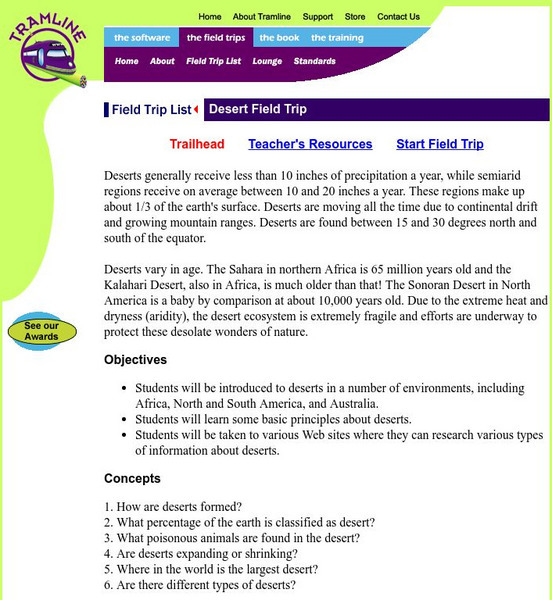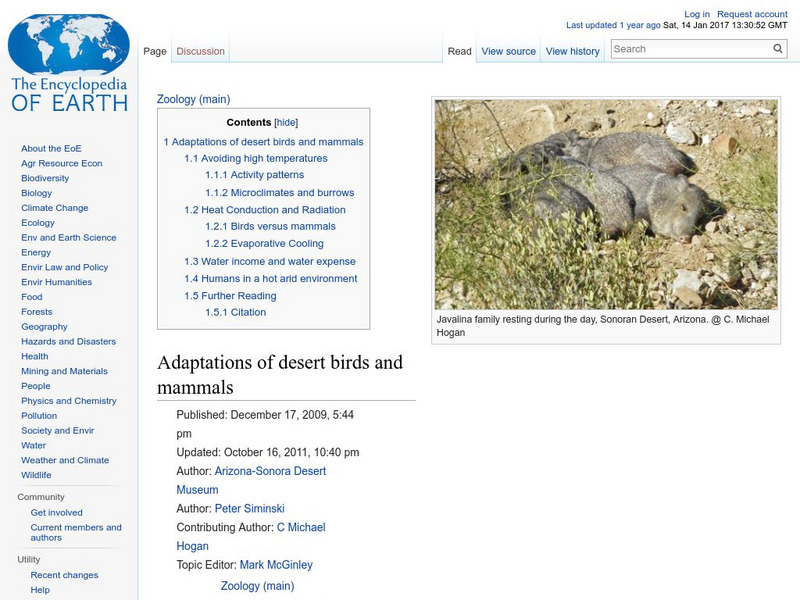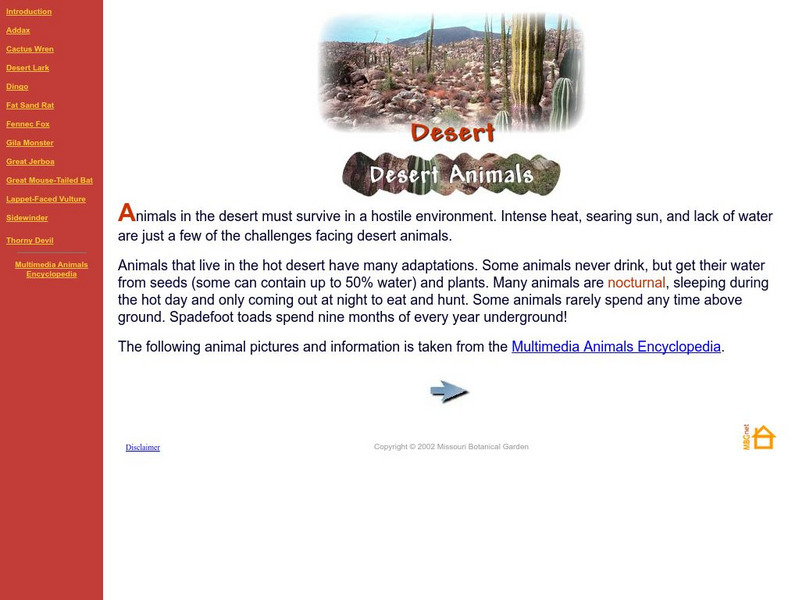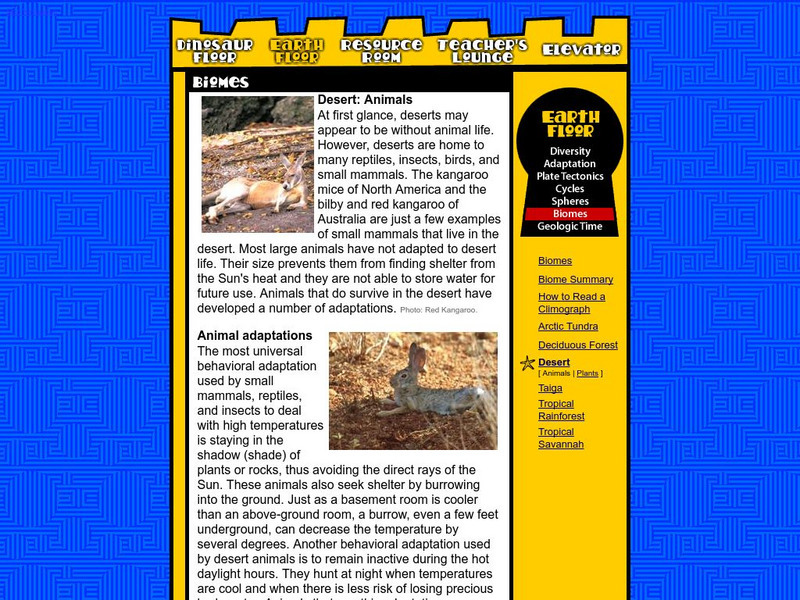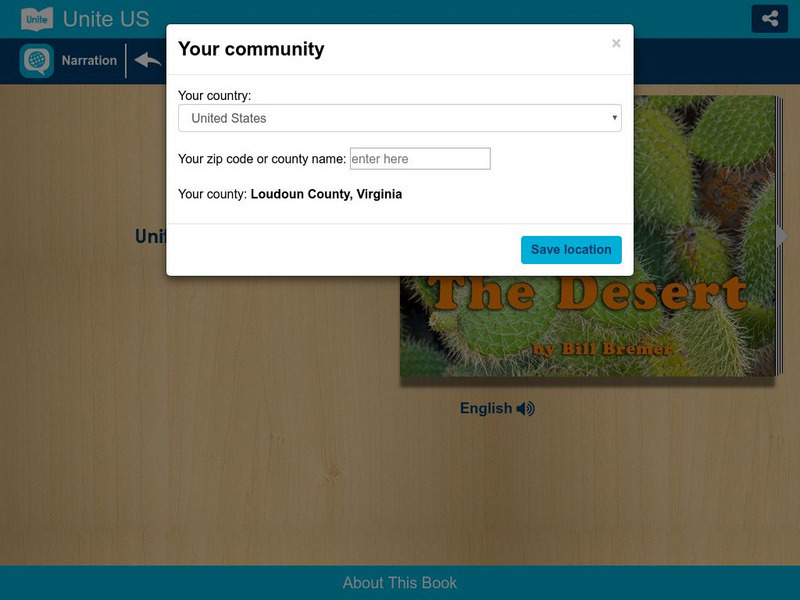Tramline
A Desert Virtual Field Trip
Travel with your students on a virtual field trip and explore the deserts of the world! This is site is interactive and informative.
Curated OER
National Park Service: Arches National Park: Animals
A resource where you'll learn about amphibians, birds, mammals, and reptiles at Arches National Park in Moab, Utah. A good look at how animals live, sleep, eat, and stay active in a desert habitat.
National Geographic Kids
National Geographic Kids: Animals: Bactrian Camel
Great site for youngers researching the Bactrian camel. Video clip, photos, and easy to read facts about habitat, young, enemies, food, adaptation to environment, and humps!
Other
Desert Gold: Desert Animals, Plants, and Rock Formation
This resource provides information about desert animals, plants, and rock formations.
Encyclopedia of Earth
Encyclopedia of Earth: Adaptations of Desert Birds and Mammals
The ways in which animals have adapted so as to survive in a desert environment are described in this article. Mechanisms that humans have to help them cool themselves in a desert are also explained. (Published: December 17, 2009)
Encyclopedia of Earth
Encyclopedia of Earth: Adaptations of Desert Amphibians and Reptiles
The evolution of amphibians from prehistoric days is described, and the challenges they face when living in a desert environment, of which the ability to reproduce is the greatest. How they manage to survive in a desert is explained in...
Missouri Botanical Garden
Missouri Botanical Garden: Animals of the Desert
Learn about different types of animals that live in the desert biome such as the cactus wren, the desert lark, the dingo, the fat sand rat, the fennec fox, the Gila monster, and so on. Animal pictures and information is taken from the...
Oxfam
Oxfam's Cool Planet: Animals of the Desert
Resource looks at the different types of insects, mammals, reptiles, and birds found in the desert and the strategies they use for survival.
The Wild Classroom
The Wild Classroom: Biomes of the World: Desert Scrub Biome
Learn about the desert scrub ecosystem. Find out about plants, animals, adaptations, and conservation efforts.
Read Works
Read Works: Cool in the Hot Desert
[Free Registration/Login Required] This nonfiction passage gives information about the fennec fox and how it stays cool in the hot African desert. This passage reinforces essential reading comprehension skills. Opportunities for...
World Wildlife Fund for Nature
World Wildlife Fund: Our Earth: Ecoregions: Habitats: Deserts
An overview of the climate conditions of deserts. Includes examples of plants and the adaptations that allow them to survive in the dry climate. Includes a link to information about animals that live in a desert habitat.
Center for Educational Technologies
Earth Floor: Desert Biome: Animals
Site provides information on desert animals and animal adaptations. Offers links to desert plants and their adaptations, other biomes, and more.
Nature Conservancy
Nature Conservancy: Planet Earth: Deserts and Aridlands
The desert areas in the United States that this organization is working to protect are portrayed through photographs and videos, showing the beauty of the landscapes and the diversity of life forms there.
Unite for Literacy
Unite for Literacy: Earth and Sky: The Desert
Learn about the plants and animals that live in the desert. Book includes audio narration in 8 additional languages with text in English.
Unite for Literacy
Unite for Literacy: Earth and Sky: Spring Comes to the Desert
Learn about springtime in the desert and the plants and animals that live there. Book includes audio narration in 20 additional languages with text in English.
Encyclopedia of Earth
Encyclopedia of Earth: Adaptations of Desert Plants
The ways in which plants have adapted through evolution in order to survive in a desert environment are described in this article. Getting water and retaining water are key to their survival, including protecting themselves from animals...
Other
Whozoo: Desert Horned Viper
Special adaptations of the Desert Horned Viper are featured on the WHOZOO website. This endangered species lives in the sand and rocks of the deserts of North Africa, Israel, Arabia, and the Sinai peninsula.
San Diego Zoo Global
San Diego Zoo: Desert Tortoise
This excellent resource from the San Diego Zoo presents extensive information on the desert tortoise including details about its habitat, physical characteristics, size, diet, family life, conservation status, and fun facts.
PBS
Pbs Learning Media: Desert Elephants
In this video from Nature, observe elephants trek across the desert to an isolated waterhole. [4:13]
Science Struck
Science Struck: Desert Biome: A Guide to Its Animals and Plants
Describes many of the plants and animals that live in deserts and their special adaptations that have enabled them to survive there. Also describes four types of deserts.
A-Z Animals
A Z Animals: Reference: Habitats: Desert
This entry identifies the defining characteristics of the desert.
Science Struck
Science Struck: Arabian Desert Facts
Presents interesting information about the Arabian Desert, including its physical geography, climate, plants and animals, their adaptations to the environment, natural resources, and threats to its habitats.
Science Struck
Science Struck: Facts About the Gobi Desert
Desertification is a growing problem in the world today and it is taking place in the Gobi Desert as well. Learn facts about the Gobi Desert, including its five ecoregions, the climate, and the flora and fauna.
The Wild Classroom
The Wild Classroom: Biomes of the World: Desert Biome
Learn all about the Desert biome. Find out about plants, animals, adaptations, and conservation efforts.
Other popular searches
- Worksheets on Desert Animals
- Habitat Desert Animals
- Namib Desert Animals
- Australian Desert Animals
- Desert Animals Lesson Plans
- Nocturnal Desert Animals
- Namibia Desert Animals
- S.w. Desert Animals
- Desert Animals in Arizona
- Booklet Desert Animals
- Animals of the Namib Desert
- Sahara Desert Animals


